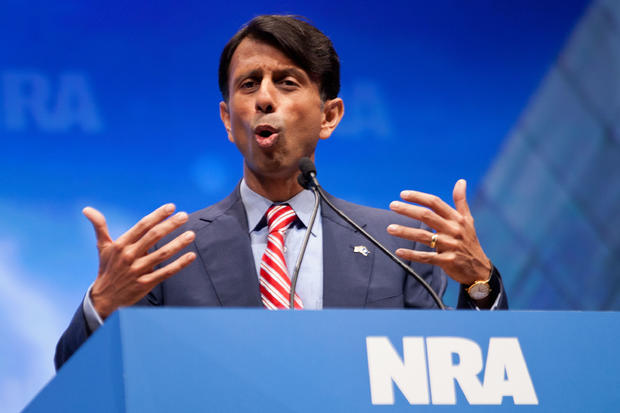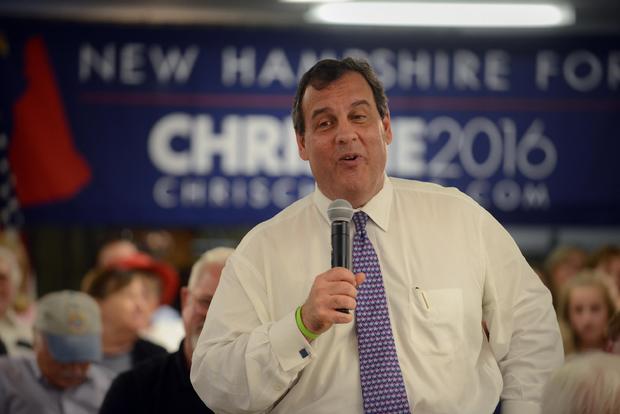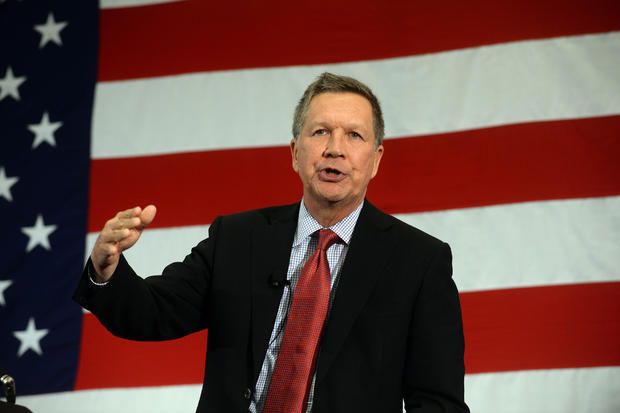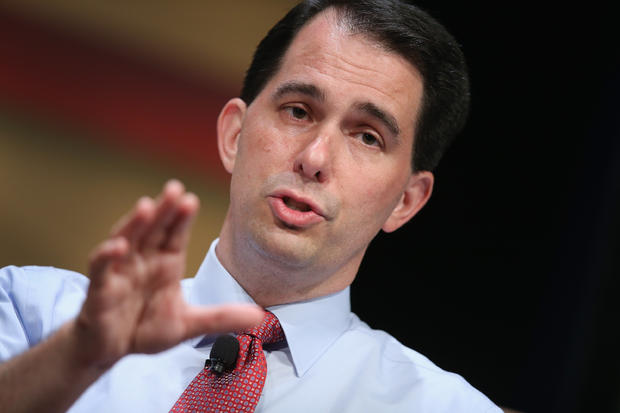Which 2016 candidate's state has the strictest gun laws?
The gunman behind last week's deadly shooting at a Louisiana movie theater, John Russell Houser, had an extensive history of mental illness - in 2008, he was even involuntarily committed to a mental facility in Georgia after threatening his family members. But during a visit to an Alabama pawnshop last year, Houser was still able to legally purchase the handgun he used to kill two people and injure nine others on Thursday evening.
And that, Louisiana Gov. Bobby Jindal told CBS News' "Face the Nation" on Sunday, is a big problem.
"Here in Louisiana, we actually passed tougher laws a couple of years ago so that for example, if Houser had been involuntarily committed here in Louisiana, that information would have automatically, we would have reported that to the national background check system," Jindal told CBS News' "Face the Nation." "He wouldn't have been able to buy a gun. He wouldn't have been able to go into that pawn shop and buy a gun as he did in another state."
Jindal's suggested that if other states had followed Louisiana's lead in enacting stricter mental health screenings for gun sales, the deadly shooting last week may have been avoided.
"I think every state should strengthen their laws," he added. "We need to make sure that this information is being reported in the background system, that the background system is working. Absolutely in this instance, this man shouldn't have been able to buy a gun."
But is it true that Louisiana has a more scrupulous background check system than its neighboring states? And what about the other states whose sitting governors are running for president - Ohio, New Jersey, and Wisconsin? What do the gun laws look like in those states? Here's a look:
Louisiana
Jindal is correct in stating that Louisiana passed a law requiring the state to report mental health cases to the federal government. But according to Everytown for Gun Safety, a pro-gun control advocacy group, the state had submitted only 908 mental health records to the federal database by the end of 2014. To measure up to states that were the most assiduous in turning over those records to the government, Louisiana would have had to submit 36,689 records to the national system.
"The law we passed in 2013 ensures that if [Houser had been committed in Louisiana in 2008, he] would be unable to purchase a gun like he did," Jindal's communications director, Mike Reed, told CBS News in a statement. "Also, the Louisiana Supreme Court just informed our office that they have reported 1,707 cases to NICS since the law passed."
However, even if Houser acquired a mental health record in Louisiana that was turned over to the federal database, there are still several loopholes that would have allowed him to buy a gun in the state without any consultation of the national background check system. He could have purchased the firearm through a private seller or at a gun show - and neither transaction would have forced him to submit to scrutiny of his criminal or mental health history.
Louisiana, in general, has very permissive gun laws. People in the state do not need a permit to purchase rifles, shotguns, or handguns, they are not forced to register their firearms, and they are not forced to earn an ownership license. They do need a permit to carry handguns, but they do not need a permit to carry rifles or shotguns.
There's also no state law banning the possession of military-style assault weapons, including semi-automatic rifles, and there's no limit to the size of a magazine that can be used in a semi-automatic gun.
Jindal has long been an outspoken opponent of gun control, and his gubernatorial record reflects that. He's taken a number of steps to expand gun rights in his state - he signed a bill criminalizing the release of the personal information of concealed handgun permit holders, a bill allowing off-duty police officers to carry guns on school campuses, a bill allowing Louisianans to obtain lifetime concealed-carry permits, and a bill permitting people to carry guns in churches.
He also criticized President Obama's call for increased gun control in the wake of the massacre at a Charleston church in June as "completely shameful," telling Fox News the president was trying to "score cheap political points."
With that kind of rhetoric and record, it's no surprise Jindal has earned an A+ rating from the National Rifle Association.
New Jersey
In contrast to Louisiana, which has some of the most permissive gun laws in the country, New Jersey has some of the strictest - though that may not be something the state's Republican governor, Chris Christie, is eager to tout as he runs for president.
Garden State residents need a permit to purchase a handgun, and an identification card to purchase a rifle or a shotgun. They're not required to register firearms, though a police record of all handgun transfers is mandated. They are required to obtain ownership licenses for any type of firearm. And they need a permit to carry a handgun, but only an ID card to carry a rifle.
There is a law banning the possession of any military-grade guns considered assault weapons, and the size of gun magazines is restricted to 15 rounds for semi-automatic guns and 6 rounds for shotguns.
Christie, as a Republican in a deep blue state, has tried to strike a balance on gun politics. He's generally avoided pushing for big changes to New Jersey's gun control laws, and he criticized the NRA after the gun rights group invoked Mr. Obama's daughters in an anti-gun control advertisement in 2013, saying he thought the spot was "reprehensible."
That remark, along with New Jersey's generally restrictive gun climate, earned Christie a "C" rating from the NRA as he sought reelection in 2013. He was also one of only two GOP candidates who did not receive an invitation to speak at an NRA forum earlier this year.
Still, Christie has blocked several bills that would have tightened New Jersey's gun restrictions even further, including a bill that would have banned the sale of .50 caliber rifles, and a bill that would have further limited magazine sizes. Earlier this year, he told New Jersey voters that if they want to roll back the gun restrictions already in place, they need to elect more GOP lawmakers.
"With a Republican legislature you'll have a governor who will respect appropriately the rights of law-abiding citizens to be able to protect themselves," he said, according to NJ.com
Ohio
Ohio's gun laws are considerably more permissive than those in New Jersey, but they're not quite as relaxed as the gun laws in Louisiana.
State residents do not need a permit to purchase rifles or handguns. They don't need to register their firearms. They are not required to obtain an ownership license for a firearm. And they don't need a permit to carry a rifle, but they do need a permit to carry a handgun.
The state does not have laws prohibiting the sale and ownership of military-style assault weapons, including semi-automatic rifles. And there is no limit on the number of rounds per magazine.
Ohio's Republican governor, John Kasich, had a long career in Congress before he ran for governor, and he managed to cast a few votes that rankled Second Amendment purists. Most notable was his vote in favor of a 1994 crime bill that included a 10-year ban on military-style assault weapons.
When he first ran for governor in 2010, the NRA actually endorsed Kasich's Democratic opponent, incumbent Gov. Ted Strickland. But during the campaign, Kasich vowed to "stand firm" in opposition to any efforts to tighten gun restrictions in Ohio. And he's generally kept that promise.
In 2011, he signed a bill allowing Ohioans to carry a concealed weapon in establishments that serve alcohol, including restaurants, nightclubs, sports stadiums, and others. According to Politifact, only "a handful of states, Tennessee and Arizona among them, have concealed carry laws as broad as Ohio's."
Kasich also signed a bill in 2012 that removed a requirement for Ohioans renewing their concealed handgun permits to undergo a competency test.
In 2014, Kasich received an A- rating from the NRA.
Wisconsin
Wisconsin's gun laws, like Ohio's, fall somewhere in the middle of the spectrum from permissive to restrictive.
The state's residents do not need a permit to purchase rifles, shotguns, or handguns. They do not need to register their firearms, and they are not required to obtain an ownership license. They also do not need a permit to carry a concealed weapon.
There are no laws banning the sale or possession of military-style assault weapons, including semi-automatic rifles, and there are no restrictions on the size of magazines that can be purchased in the state.
Wisconsin Gov. Scott Walker, a favorite among conservatives, has carefully nurtured his reputation as a friend of gun rights advocates, enacting a series of measures since taking office in 2011.
In his first year in office, he signed a bill instituting the "castle doctrine," a form of stand your ground law that allows people to defend themselves, using lethal force if necessary, against intruders entering their home illegally.
And in 2015, Walker signed a bill repealing the 48-hour waiting period for handgun purchases.
It's a record that has earned Walker plenty of accolades from the NRA and other gun rights groups - and one he's ready to brandish on the presidential campaign trail as he courts conservative voters.
"It is my honor to work with the NRA in my state and across the country. I'm proud of my A+ rating as governor," he said in April during an NRA forum. "Some on the left might call it a 'scarlet letter' but I consider it a badge of honor."



